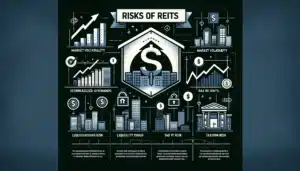With regular income and the possibility for capital growth, real estate investment trusts (REITs) give investors the chance to engage in real estate without the burden of property ownership.
However, specific risks related to the real estate sector are tied to this investment opportunity.
If you are looking to invest as an expat or high-net-worth individual, which is what I specialize in, you can email me (advice@adamfayed.com) or WhatsApp (+44-7393-450-837).
This page will discuss REITs pros and cons, as well as if they are a good investment.
Benefits of Investing in REITs

REITs investing offers a multitude of benefits, making it a standout option for diversifying investment portfolios.
The primary advantage lies in the diversification potential. Real estate is a distinct asset class that often moves inversely to stocks and bonds, providing a cushion against market volatility.
Another significant advantage is the dividend yield potential. REITs are renowned for their high dividend payouts, a result of the requirement to distribute at least 90% of taxable income to shareholders.
This aspect of REITs investing makes it an excellent choice for income-focused investors, providing a regular income stream in addition to potential capital appreciation.
Liquidity marks another benefit of REITs investing. Unlike direct real estate investments, which can take months to buy or sell, REIT shares are traded on major stock exchanges.
This means investors can buy or sell their REIT investments with ease, similar to how they would trade stocks. This level of liquidity is especially appealing for investors who may need to quickly adjust their portfolios in response to changing market conditions.
REITs Risk

REITs often exhibit sensitivity to interest rate changes. As interest rates rise, the cost of borrowing increases for REITs, potentially reducing profit margins. Higher rates also make bonds and other fixed-income investments more appealing, leading to a decrease in REITs’ market prices.
Investors should consider the current interest rate environment and future forecasts when investing in REITs. Balancing your portfolio to mitigate these risks involves careful planning and market analysis.
The real estate market can be volatile, influenced by economic factors, market trends, and geopolitical events.
This volatility can significantly impact REITs’ performance, affecting their value and the dividends they pay out. Investors need to assess their tolerance for such volatility before committing to REITs investing.
REITs investing requires a certain risk tolerance and investment horizon. Investors seeking short-term gains or those with a low tolerance for market fluctuations may find REITs unsuitable.
Additionally, REITs, by law, must distribute at least 90% of their taxable income to shareholders as dividends, leaving less capital for reinvestment and growth.
This distribution model might not align with the growth objectives of certain investors who prefer reinvesting profits for exponential growth.
Are REITs a Good Investment?
Historically, REITs have provided competitive total returns, driven by dividend payouts and capital appreciation, particularly in environments of moderate inflation.
The performance of REITs correlates with economic cycles. During periods of economic growth, real estate demand increases, driving up rents and property values.
Consequently, REITs often perform well. However, they can be sensitive to interest rate changes. Rising rates increase borrowing costs for REITs, potentially reducing their profitability and dividend payments.
REITs investing also involves risk factors, including market volatility and sector-specific risks. For instance, retail REITs may face challenges from e-commerce growth, while office REITs could be affected by shifts in workplace dynamics.
Pained by financial indecision?

Adam is an internationally recognised author on financial matters with over 830million answer views on Quora, a widely sold book on Amazon, and a contributor on Forbes.

